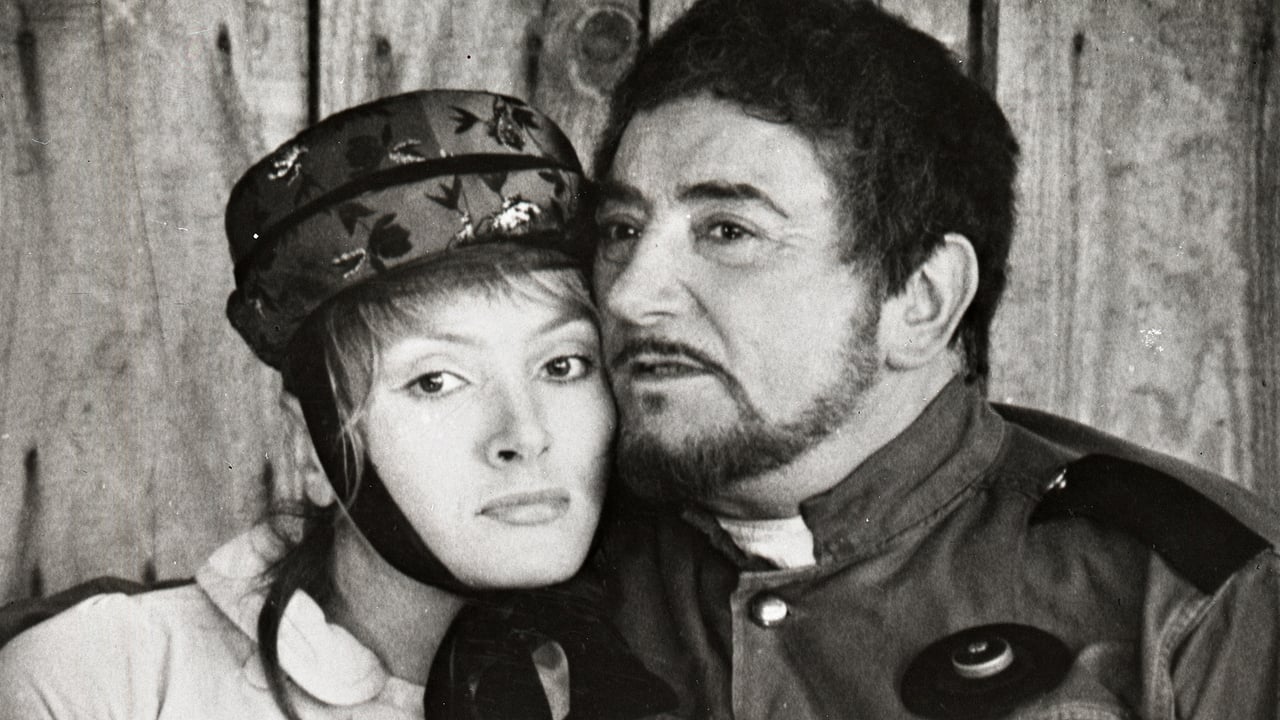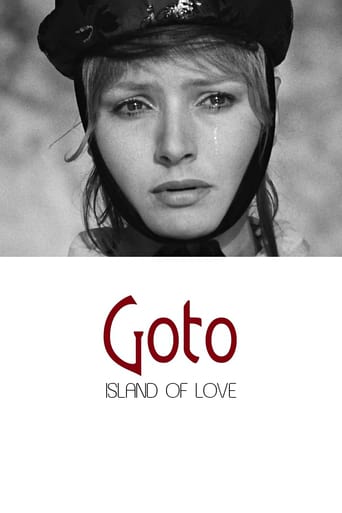



This is one of the few movies I've ever seen where the whole audience broke into spontaneous, loud applause a third of the way in.
View MoreThere are moments in this movie where the great movie it could've been peek out... They're fleeting, here, but they're worth savoring, and they happen often enough to make it worth your while.
View MoreThere are moments in this movie where the great movie it could've been peek out... They're fleeting, here, but they're worth savoring, and they happen often enough to make it worth your while.
View MoreExcellent and certainly provocative... If nothing else, the film is a real conversation starter.
View MorePolish-born, French-based filmmaker, animator and artist Walerian Borowczyk is mainly remembered for his erotic works such as The Beast and The Margin, and has been described as "a genius who also happened to be a pornographer." Before he dabbled in eroticism, he produced many animated shorts before his first feature-length piece, the wonderfully weird Mr. and Mrs. Kabal's Theatre. His first live-action film, Goto, Isle of Love, employed similar tactics to his hand-drawn experiments: a desolate island setting, limited camera movements, and frustratingly (yet fascinatingly) odd and unrelatable characters. The result is somewhat isolating, but often reminiscent of the surreal genius of Georges Franju, Luis Bunuel and Borowczyk's friend and sometime collaborator Chris Marker.Tidal inundation has seen the island of Goto cut off from the rest of Europe for three generations. It has seen three leaders since - Goto I, Goto II, and the current ruler Goto III (Pierre Brasseur) - and the monarchy rules as a dictatorship, 'protecting' the island from outside dangers and influences. There seems to be little to do on the island, so Goto keeps himself and his wife Glossia (Ligia Branice) entertained by staging fights between prisoners. Petty thief Grozo (Guy Saint-Jean) manages to survive his battle with a towering lug-head and wins the sympathy of Goto. Grozo's reward is a job building fly-catchers and showing off his work to a classroom of under-educated children. He also uncovers an affair between Glossia and handsome captain-of-the-guard Gono (Jean-Pierre Andreani), and grows bolder and more ambitious in his scheming as he seeks to claw himself up the social ladder.On an island populated by criminals, no-hopers and aristocrats, Glossia emerges as the only sympathetic character. Played by La Jetee's Ligia Branice, she longs to escape this grey, mundane world, her eyes shining with tears as she watches the boat she hoped to sail away on sank before her. With little to hold on to on an emotional level, Goto becomes an observational piece, a commentary on an isolated society with an obvious anti-dictatorship stance. This is a world so lacking in stimulation that the object which draws the most fascination is a cutting-edge fly-catcher stolen by Gozo and flogged as his own design. It's deliberately farcical but lacking in humour, with the world made even more soul-crushing by the stark black-and-white photography and Borowczyk's preference for limited camera movements. It's an interesting piece but one that will likely leave you feeling cold, but certainly a work of art deserving of rigorous study.www.the-wrath-of-blog.blogspot.com
View MoreThis was the debut feature from infant terrible producer Walerian Borowczyk who went on to make such films as 'Blanche', 'Immoral Tales',and 'Behind Convent Walls' ' and became known for his use of sexual scenes or art house porn, which does not appear very much in this film.Set on an archipelago that has suffered a major natural disaster we find a community stuck in the past. They are cut off from the outside world they have stubbornly maintained the status quo.Their leader is Goto who has assumed Kingship by some constitutional necessity. He seems to look on his subjects as he does his pet Alsatian dogs and is married to the beautiful Glyssia played by Ligia Branice ('Blanche'). One of the forms of entertainment is the public fights, which take place on a ropey stage where talentless musicians torture home made instruments in a sort of 'end of pier show' and display of awfulness. These fights are punishment for all crimes whether theft or murder and the loser is executed.Grozo survives one such encounter and is spared. His reward is to be the royal boot polisher - keeper of the royal dogs and maker of fly traps. He lusts after Glyssia like a sixteen year old and his first crush. She however, has fallen for a dashing officer - and keeper of the royal horse - and they have decided to escape. Grozo though could teach Machiavelli a thing or two and soon his plan to gain power, which will lead to requite his lust, is in full motion.This is an Art-house film which is filmed in monochrome, but several parts are in Eastman colour for dramatic and stylistic effect, most of the camera angles are fixed - adding to the voyeuristic nature of the film. Walerian Borowczyk was developing his style here and he won't be to everyone's taste. Some could view this as self indulgent, cold and even dystopian and that is the whole point. The use of props, shots and scenarios are designed to craft a world that we are asked - not to accept - but to at least try to understand. It is that final part that makes him such an interesting director. This then is arty on purpose, quirky and far from run of the mill and for film historians is probably a must see.
View MoreAfter having long wanted to watch this, I finally caught up with Borowczyk's feature-film debut on DVD-R while I was in Hollywood in late 2005. As it happens, only days later it was announced for release on R1 DVD - and not long after that, the director himself passed away! Anyway, even if the copy I first watched didn't include the brief color shots that were a part of the original version (and which, thankfully, are intact on the Cult Epics DVD), I was still highly impressed with the film - counting it not just among the most original and remarkable debuts ever but, along with its follow-up BLANCHE (1971), Borowczyk's finest work! Virtually all of the director's stylistic qualities and thematic interests are already to be found here (save perhaps the religious aspect which would be out of place in such a remote totalitarian setting as the one in which the events unfold); as was to become increasingly evident in subsequent efforts, eroticism is at the core of the plot which is quite simple really, as the film is best approached as an allegorical fable and mood piece - or, if you like, merely a canvas for former animator Borowczyk on which to scrape his ideas, methodically shaping his own distinctive vision (David Thomson in "Time Out" calls it a veritable art film, not because of its occasional pretentiousness but for the way in which one is always conscious of its being essentially a work of artifice).Typically of Borowczyk, then, the detail is obsessive, memorable and often surreal: the fact that the first name of the entire population starts with the letter G; the three-way portrait of Goto's current ruler and his two predecessors hung on the school-room walls (wherein the only history being taught is that of the island itself); the unusual way in which prisoners - all crimes, whether big or small, seem to be punishable by death - are executed (they're brought before the court in pairs and made to engage in physical combat, with the loser eventually being beheaded while the winner is set free!); equally disturbing is the social structure on the island (the father of the Governor's wife attends to the 'royal' kennels while her mother is one of the prostitutes in the local brothel), etc. Another important aspect of the film which became synonymous with virtually all of Borowczyk's subsequent features is his unnerving juxtaposition of absolute silence and deafening organ music (in this case, the work of Handel).Things come to a head when Grozo, an ambitious and lecherous man saved from the gallows (played by Guy Saint-Jean), is employed by the Governor - a majestic Pierre Brasseur in one of his last roles - in the kennels (as well as Goto's official fly-catcher and boot-polisher!); his envy of both the latter's position and wife sends him on a spiral of murder and deception till he has replaced him on the 'throne' and intends to take Glossia (the graceful Ligia Branice, Borowczyk's own wife, who's actually having an affair with her dashing horse-riding instructor and who had even planned to flee the island by boat!) for himself; by the end of the film, however, he's all alone, desperate and on the verge of madness. In conclusion, though admittedly obscure and deliberately paced, the film is nevertheless vivid, constantly imaginative and, ultimately, haunting.
View MoreWalerian Borowczyk is rarely mentioned these days but back in the 1970s and 1980s he created quite a stir with arthouse/soft porn movies like 'Immoral Tales', 'Behind Convent Walls', 'Dr Jekyll and His Women', and especially his sensational 'The Beast', which is still quite unlike any movie you've ever seen, believe me! So I was very interested to be able to watch 'Goto', which I believe was his first full length feature. It doesn't have the sexual content you might expect (there is some very brief nudity, but that's it really), but it's still VERY odd, even for Borowczyk, and utterly fascinating. The story is set on the island of Goto, which after a natural disaster in the late 19th Century, has kept its society frozen in the past. Nothing much changes and everything is static and ritualized. This makes the plot reminiscent of Kafka and Mervyn Peake. Mentioning those two might give you SOME idea of what to expect, but it's a very difficult movie to categorize or describe. It's nowhere near as outrageous as some of Borowczyk's later and better known work, but if you treasure strange and unusual movies I highly recommend you track it down.
View More